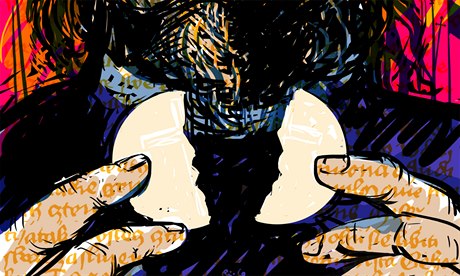We all need heroes – figures who stand out in the pages of history, representing ideals that remain living realities and aspirations. Some heroes who were seen as inspirational by earlier generations have lost their appeal to the modern age, often because they are linked with political or social values that are no longer considered appropriate or acceptable.
This poses a real problem in Great Britain. Many British heroes of the past – such as Lord Nelson and the Duke of Wellington – were associated with the expansion of British imperial power. In an age of postcolonial guilt, few in Britain now want to celebrate their memory or legacy. They are seen by bien pensants as awkward reminders of an imperial history, which many would prefer to forget.
But Jan Hus is different. Many Czechs will be marking the 600th anniversary of his martyrdom on 6 July 1415 – and with good reason. Hus is a rare example of a figure who intersects the cultural, intellectual, and religious spheres. He promoted values which still resonate with many in the Czech Republic and beyond.
Hus’s name and image are everywhere to be seen. He dominates the Old Town Square in Prague, and streets bearing his name can be found in most cities. The motto of the Czech Republic is pravda vítězí, a shortened form of the slogan pravda vítězí nade vším, used by Hus’s followers in the decades following his death.
Wycliffe’s influence
Hus was born in Bohemia sometime around 1370. He studied at Charles University, which had been founded in 1348, and was in the process of establishing itself as one of the leading universities of central Europe. After graduating, Hus was ordained as priest, and exercised a ministry in Prague at the Betlémská kaple, during which he repeatedly called for reform of the church in his preaching. His election as Rector of Charles University for the academic year 1402-3 clearly suggests that he was well regarded within its academic community.
In 1403, Zbyněk Zajíc was elected as Archbishop of Prague, and encouraged Hus to continue his calls for the reform of the church. The Archbishop’s support for Hus gave a new respectability for this movement for reform, which had parallels with other reforming movements in Europe around this time. In particular, Hus’s reforming programme was similar to that which had been advocated a few decades earlier in England by the Oxford academic John Wycliffe (c. 1331-84).
Wycliffe was critical of the privileges of the clergy, and the extravagant lifestyles of bishops. In some ways, Wycliffe can be seen as advocating a national vision of the church. He wanted the church to use the English language, rather than Latin, and was critical of the Pope’s influence over English politics. Surely there ought to be an English church for the English people?
Wycliffe’s influence over Hus was considerable. Hus had access to Wycliffe’s ideas through Jeroným Pražský (1379 -1416), a Bohemian scholar who spend some time at Oxford University, and copied out some reforming texts written by Wycliffe. Hus clearly saw Wycliffe as providing him with the intellectual resources he needed to create a Czech national church, independent of the political power of the Pope.
“Great Schism”
Yet Hus’s reforms extended beyond the realm of intellectual reflection, and included the practice of the church. Whereas the church officially permitted only clergy to receive bread and wine at communion (laity only being allowed to receive bread), Hus insisted that all believers should be allowed to receive “communion in both kinds” – that is, both bread and wine. It was an important statement of the parity of clergy and laity.
There were many during Hus’s lifetime who were disturbed by the soaring power and influence of the papacy, and sought to prevent it getting out of control. The influential Conciliarist movement argued that ecclesiastical power should be decentralized. Instead of being concentrated in the hands of a single individual, it should be dispersed within the body of the church as a whole, and entrusted to a more representative and accountable group – namely, “general Councils”. This movement reached the height of its influence in the fifteenth century.
Those who believed that the identity of the church was safeguarded by the authority of the pope found themselves in a dilemma because of the “Great Schism”. For a period of more than forty years, there were two claimants to the title of the papacy in Europe, one based in Rome, the other in the southern French city of Avignon. This state of affairs caused confusion, and seriously weakened the authority of the church.
Many senior church figures quietly came to the conclusion that these tensions could not be sustained without doing permanent damage to the church. The schism was finally resolved by the Councils of Pisa (1409) and Constance (1414-18), which led to the election of a single pope, based in Rome.
In-fighting within Charles University
The repercussions of this schism were felt in Prague during the 1400s. Václav, king of Bohemia (1361-1419) was sympathetic to the Avignon anti-Pope, Benedict XIII; Zbyněk Zajíc supported the Roman Pope, Gregory XII. Václav ordered the clergy of the region, and the academics at Charles University, to remain neutral in this controversy.
Hus was caught up in the in-fighting within Charles University. At that time, the University was divided into four nationes – groups of scholars, identified by their geographical origins. The Bohemian natio, led by Hus, advocated neutrality in the conflict; the Bavarian, Polish and Saxon nationes supported Gregory XII. There was thus a clear majority within the University in favour of the Roman pope.
This situation changed dramatically in January 1409. Václav issued the Decree of Kutná Hora, which declared that the Bohemian natio would now be allowed three votes in university matters, while the remaining nationes would only have one vote between them. Charles University now supported a policy of neutrality. This manoeuvre, however, proved devastating for the university’s reputation.
The sidelined nationes considered they had no future at the University. The University of Leipzig was founded in May 1409, and absorbed many of those scholars who now left Prague. By the beginning of the academic year 1409-10, Charles University was in serious decline, and would soon be eclipsed by other universities in the region, particularly Leipzig.
There are some who reasonably suggest that the decline in the international reputation of Charles University and its dwindling student numbers are largely due to Hus. Yet this is probably unfair. Hus took a neutral position in a controversy in which there could only be losers, and no winners.
The real force behind this political academic manoeuvring was Václav, who had probably unrealistic aspirations to become the Holy Roman Emperor, and needed papal support to achieve this objective. In the end, the Council of Pisa elected a new pope, Alexander V. But his two rivals refused to accept his authority. The matter would not be resolved until a decade later. However, Alexander was recognized as the legitimate Pope by Václav, Hus, Charles University, and (reluctantly) Zbyněk Zajíc.
The threat to the church
Having been elected Pope, Alexander V declared that John Wycliffe was a heretic, with the implication that those who advocated or disseminated his ideas were themselves complicit in this heresy. Historians have noted the dramatic alteration in meaning of the term “heresy” during the history of the church.
In the early church, a “heresy” was an inadequate formulation of a Christian idea, which led to it becoming incoherent or unstable. It was a theological, not a political idea. By the late Middle Ages, however, the concept of heresy had changed radically. Movements came to be denounced as “heretical” when they were seen as a threat to the social and political status of the church or the Pope. An essentially theological idea was thus politicized. The real concern was not theological authenticity, but safeguarding the power and influence of the church.
There is a fundamental issue of power here, illustrated neatly by Wycliffe’s reforming programme. By insisting that the Bible should be translated into English, Wycliffe was widening access to this text, and allowing people to judge for themselves what it meant. The effect of Wycliffe’s “heresy” was thus to weaken the church’s grip on the control of how the Bible was to be interpreted. What if the laity came to the conclusion that the Bible did not warrant the authority of the Pope, or the privileges of the clergy? Hus was known to be a prominent Bohemian supporter of Wycliffe, and thus fell under suspicion of heresy.
However, papal attempts to censure or silence Hus proved highly divisive and unpopular. This unwise papal intervention reinforced the perception of an alien ecclesiastical authority trying to impose its will on Bohemia, whose king and people supported Hus.
Alexander V died in 1410, thus removing the immediate pressure to act against Hus, who now campaigned against centralized ecclesiastical authority being imposed on Bohemia from Rome. Following Wycliffe, Hus declared that Bohemia should be free to govern its own church, and that decisions should require the support of the state power. He renewed his criticism of the political powers of both church and papacy in his treatise de ecclesia (“on the church”, 1413), which drew extensively on Wycliffe’s writings.
Hus was now seen as a serious threat to the power of the church, in effect advocating a nationalist vision of state churches that could only lead to the fragmentation of the church and a serious reduction in the power of the Pope. With hindsight, Hus can be seen to have anticipated many of the leading themes of the Protestant Reformation of the sixteenth century. Indeed, Martin Luther came to see himself as renewing Hus’s campaign of reform a century later, through his emphasis on the need for a national church that used the vernacular, that administered communion in both kinds (bread and wine), and that recognized the importance of the laity.
The reconciliation
Hus’s fate was now sealed. He was safe in his native Bohemia, where he enjoyed protection by the state. Yet when the Council of Constance was convened in 1414 to settle the question of the papacy, Hus believed his voice needed to be heard.
He seems to have realized the risk he was taking in leaving the safety of his homeland. In the end, he was arrested, condemned for heresy, and finally burned alive on 6 July 1415, refusing to renounce his ideas in order to save his life. News of his death provoked disgust and outrage in Bohemia, and led to a centuries-long alienation between Prague and Rome.
Yet reconciliation with Catholicism proved possible. In 1999, Miloslav Vlk, the Catholic Archbishop of Prague, crafted a careful apology for the “cruel death” of Hus. This apology was delivered by Pope John Paul II, who expressed “deep sorrow” for Hus’s death, and praised his “moral courage.” Hus has been rehabilitated within Catholicism, adopted as a model by some liberation theologians (such as Leonardo Boff), and now being seen by some as a prototype of the reforms introduced by the Second Vatican Council.
Yet for most the church has now ceased to be seen as an enemy or oppressor. Others have arisen in its place. It is interesting to note how Hus seems to have been an inspiration to those who fought against the monolithic state apparatus following the forcible ending of the Prague Spring of 1968. Both Jan Palach and Jan Zajíc chose to burn themselves alive in 1969 in protest against the imposition of Soviet authoritarianism. Was this, many wonder, a desire to identify with Hus here, both in their opposition to an alien authority and in the manner of their deaths?
The greatest legacy
In a lecture of 1999, Václav Havel identified Hus as a source of national inspiration, and values that could serve Hus’s homeland in a new phase of its history.
There is a deeper point here, which merits reflection. Hus believed that there was a transcendent truth, which he was required to respect, even if this was in conflict with his own safety or life. Truth was not a matter of human construction, but of human respect for an order of things that lies beyond us.
This notion remains a powerful weapon against those power groups who try to impose socially-constructed notions of truth upon us. Hus helps us to see why we need to judge all authorities – social, cultural, and religious – by a standard which lies beyond them, and to which they are ultimately accountable. Truth continues to matter.
Perhaps Hus’s greatest legacy to Czech culture thus remains his well-known dictum on truth: Hledaj pravdy, slyš pravdu, uč se pravdě, miluj pravdu, braň pravdu až do smrti, neboť pravda tě vysvobodí. And if Hus was indeed the author of De orthographia Bohemica (c. 1406), his legacy lives on in the written form of that dictum, as much as in its substance!
Hus remains an inspiration to many – for his sense of national pride and identity, his concerns to deal with institutional abuse, his passionate concern for truth, and his courage in the face of death. He is now remembered as a towering figure of pan-European significance – a hero of the mind, who finally became a hero in his body. There is much to celebrate about Hus as we recall the 600th anniversary of his death. There is also much that we can learn from him.





